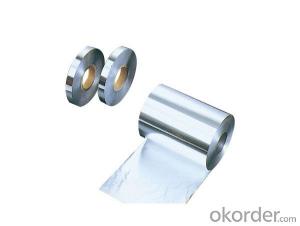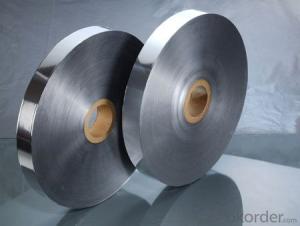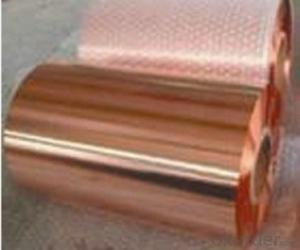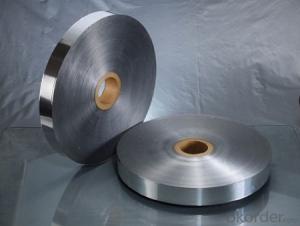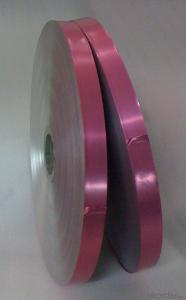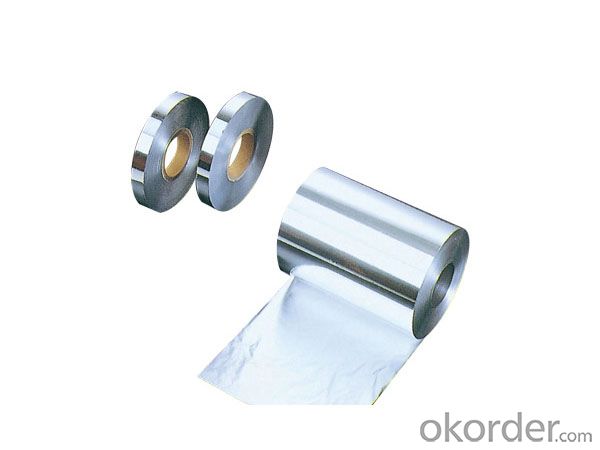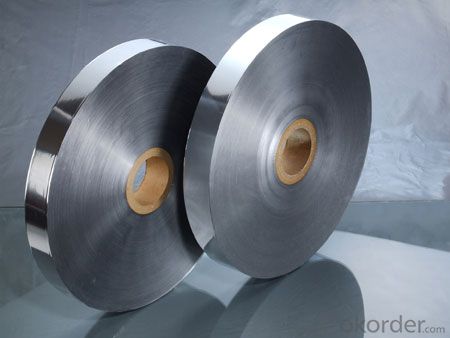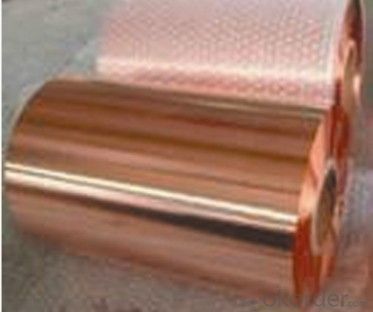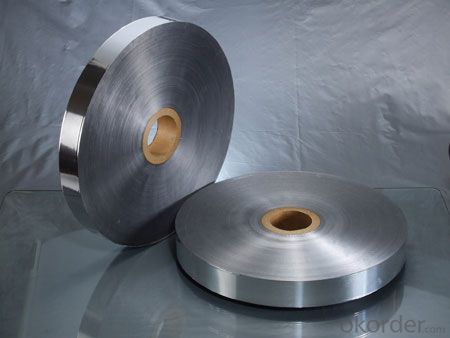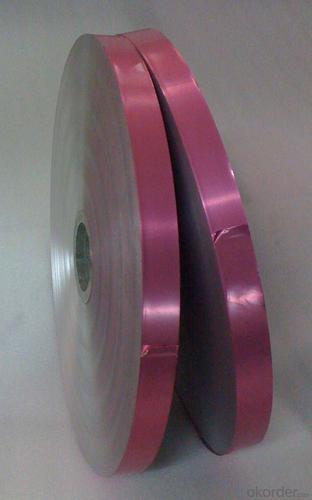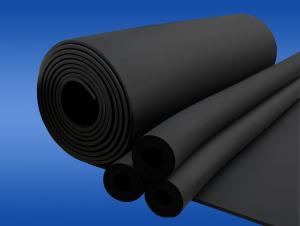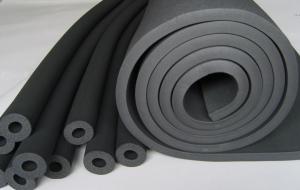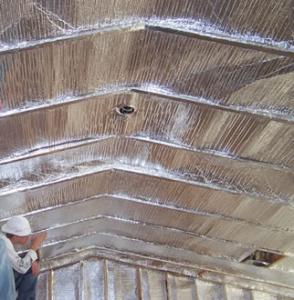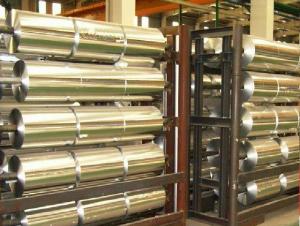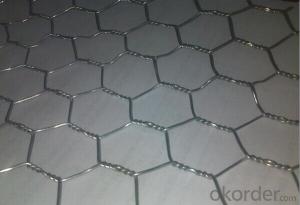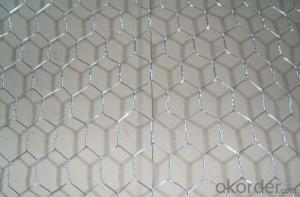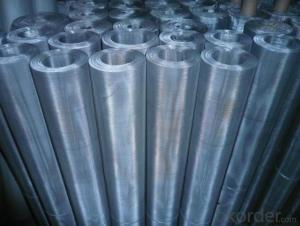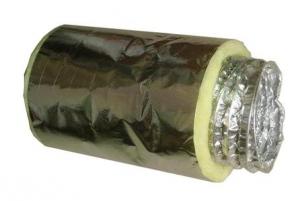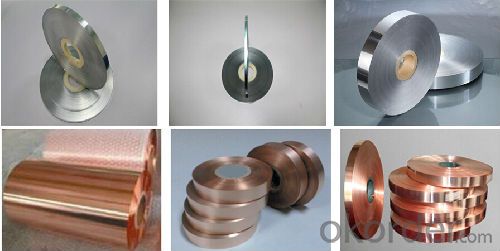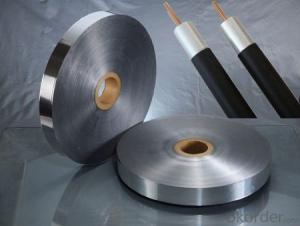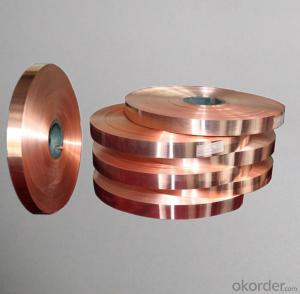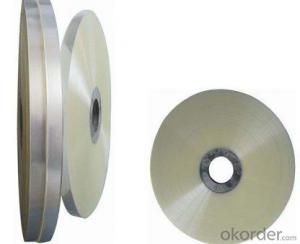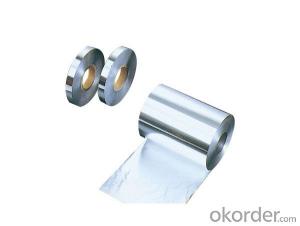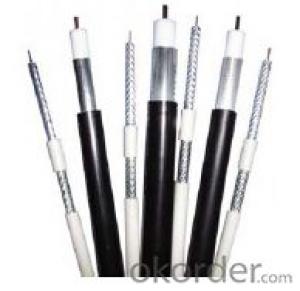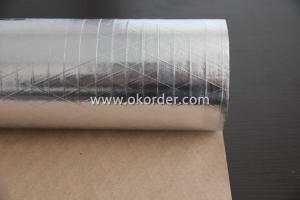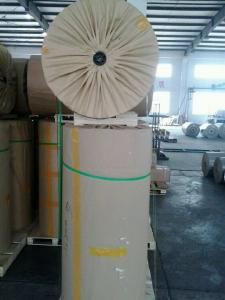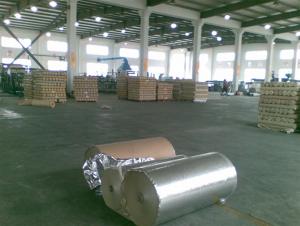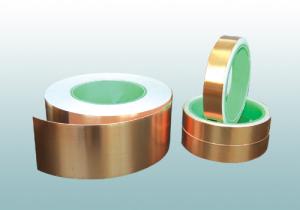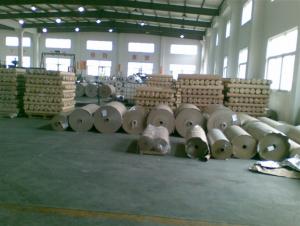Aluminum Foil Facing Shielding Copper Polyester Foil for Coaxial Cables
- Loading Port:
- Shanghai
- Payment Terms:
- TT or LC
- Min Order Qty:
- 1000 m²
- Supply Capability:
- 1000000 m²/month
OKorder Service Pledge
OKorder Financial Service
You Might Also Like
Aluminum Mylar foil Shielding Foil for Coaxial Cable communication cable
1.Structure of Aluminum Mylar foil Shielding Foil Description:
Electrical cable is used to transfer electricity, information and the realization of electromagnetic energy transformation. The electrical cable in a broad term mainly indicates to cable and in a narrow term indicate insulation material. Its definition is the aggregation of different parts below: one or more insulation cores, the wrapping layers of the cores, the general protective layers and the outer protective layers. Cables also include additive conductor without insulator.
2.Main Features of the Aluminum Mylar foil Shielding Foil:
Aluminum Mylar foil Shielding Foil is applicable to the shielding of coaxial cable, local network wire, electronic communication cable and computer peripheral wire etc.
1.Thickness: min 6.5mic; width: 300-1000mm.
2. According to GB/T 3198-2010.
3.Usages: cable shield, candy wrap
3. Aluminum Mylar foil Shielding Foil Images
4. Aluminum Mylar foil Shielding Foil Specification
AL-PET laminated foil
Description: Apply for overall or individual twisted pair shield for electronic cable and local network cables, protect from external electromagnetic interference. Features option of LUBRITAPE apply to decrease 50% friction of aluminum surface.
Construction: Aluminum foil, Polyester film
CODE | TOTAL THICKNESS | ALU THICKNESS | GLUE | POLYESTER FILM | WEIGHT |
FP007012 | 22±3 | 7 | 3 | 12 | 38.8±5% |
FP010012 | 25±3 | 10 | 3 | 12 | 46.9±5% |
FP020020 | 43±3 | 20 | 3 | 20 | 83.8±5% |
FP025012 | 40±3 | 25 | 3 | 12 | 87.6±5% |
Special specifications are also available, according to customer’s order. | |||||
AL-PET-AL laminated foil
Description: resilient shielding in cable assembling and provide the enhanced shielding required in harsh environments.
Construction: Aluminum foil +Polyester film+ Aluminum foil
CODE | TOTAL THICKNESS | ALU THICKNESS | GLUE | POLYESTER FILM | GLUE | ALU THICKNESS | WEIGHT |
DFP007015 | 35±3 | 7 | 3 | 15 | 3 | 7 | 65±5% |
DFP009020 | 39±4 | 9 | 3 | 15 | 3 | 9 | 76±5% |
DFP015025 | 61±5 | 15 | 3 | 25 | 3 | 15 | 115±5% |
DFP025025 | 80±5 | 25 | 3 | 25 | 3 | 25 | 175±5% |
Special specifications are also available, according to customer’s order. | |||||||
Bonded AL-PET laminated foil
Description: A laminated aluminum-polyester-aluminum tape is fully bonded to the foam dielectric to provide 100% coverage, longitudinally applied over the polyethylene core and the tape minimizes signal leakage.
Construction: Aluminum foil + Polyester film + Aluminum foil + EMAA film
CODE | TOTAL THICKNESS | ALU THICKNESS | GLUE | POLYESTER FILM | GLUE | ALU THICKNESS | GLUE | EMAA | WEIGHT |
DFPH009012 | 65±5 | 9 | 3 | 12 | 3 | 9 | 3 | 25 | 98±5% |
DFPH009020 | 72±5 | 9 | 3 | 20 | 3 | 9 | 3 | 25 | 108±5% |
DFPH009025 | 75±5 | 9 | 3 | 25 | 3 | 9 | 3 | 25 | 114±5% |
DFPH010025 | 84±5 | 10 | 3 | 25 | 3 | 10 | 3 | 25 | 126±5% |
Special specifications are also available, according to customer’s order. | |||||||||
Copper polyester foil
Description: Copper foil, copper lamination foil typically use as shielding for low/medium voltage cable and radio frequency coaxial cable. The rolled annealing copper foil is flexible to wrap cable core, also it has the excellent physical properties, Polyester film provides electrical insulation and high mechanical properties.
Construction: Copper foil + Polyester film
CODE | TOTAL THICKNESS | CU THICKNESS | GLUE | POLYESTER FILM | WEIGHT |
CP018012 | 33±3 | 18 | 3 | 12 | 175±10% |
CP007020 | 46±3 | 18 | 3 | 25 | 195±10% |
CP015012 | 30±3 | 15 | 3 | 12 | 160±10% |
Special specifications are also available, according to customer’s order. | |||||
5.FAQ
We have organized several common questions for our clients,may help you sincerely:
① Where you used this foil?
Aluminum Mylar foil Shielding Foil is used for cable shield, candy wrap for the shielding of coaxial cable, local network wire, electronic communication cable and computer peripheral wire etc.
②How to guarantee the quality of the products?
We have established the international advanced quality management system,every link from raw material to final product we have strict quality test;We resolutely put an end to unqualified products flowing into the market. At the same time, we will provide necessary follow-up service assurance.
③How long can we receive the product after purchase?
In the purchase of product within three working days, We will arrange the factory delivery as soon as possible. The pecific time of receiving is related to the state and position of customers.Commonly 7 to 10 working days can be served.
- Q: The user is asking if they can reuse their old aluminum foil facing to create new ones once it becomes worn out.
- <p>No, you cannot create new aluminum foil facings from old, worn-out ones. Aluminum foil facings are typically made from a specific type of aluminum that is bonded to a substrate. Once it wears out, the aluminum layer is compromised and cannot be reused to make new facings. Recycling old aluminum foil is the best option to reduce waste and conserve resources. You can recycle aluminum foil, which will then be processed and turned into new aluminum products.</p>
- Q: Explain the distinctions between aluminum foil facing and plastic wrap, including their composition, uses, and properties.
- <p>Aluminum foil facing is a thin layer of aluminum used for insulation, moisture protection, and as a barrier to light and air. It is commonly used in construction and food packaging for its heat and cold resistance. Plastic wrap, on the other hand, is made from plastic polymers like polyethylene and is primarily used for food storage, keeping food fresh by sealing in moisture and preventing contamination. Unlike aluminum foil, plastic wrap is transparent, clingy, and does not conduct heat, making it unsuitable for cooking or insulation purposes.</p>
- Q: Describe the most effective methods for utilizing aluminum foil in cooking.
- <p>Aluminum foil facing can be used effectively in cooking in several ways: 1) As a barrier to prevent food from sticking to the pan or grill, reducing the need for oil or butter. 2) To wrap foods for steaming, which helps retain moisture and flavor. 3) As a cover to keep food warm after cooking or to prevent overcooking. 4) To create packets for cooking fish, vegetables, or other foods en papillote, which steams the food in its own juices. 5) For baking, it can be used to line pans to prevent sticking and to make cleanup easier. 6) Foil can also be shaped into a tent to cover food during the last few minutes of cooking to prevent it from drying out. Always ensure the shiny side of the foil faces inwards when in contact with food to avoid any potential chemical reactions with the food.</p>
- Q: What are the advantages of using aluminum foil as a reflective surface in various applications, particularly in health contexts?
- <p>Using aluminum foil facing provides several health benefits, particularly in cooking and food preservation. It helps retain moisture in foods, reducing the need for added fats and oils, which can contribute to a healthier diet. Reflective aluminum foil can also help distribute heat evenly in ovens, ensuring food cooks more uniformly and reduces the risk of overcooking or burning. Additionally, it can help in food reheating, ensuring that food is heated evenly and thoroughly, which is important for food safety. In some cases, aluminum foil can also be used to create a barrier against harmful UV rays in tanning beds, although this is not recommended due to potential health risks associated with tanning. Overall, the use of aluminum foil facing can contribute to healthier cooking practices and food safety.</p>
- Q: What are the various materials used as facings for aluminum foil, and how do they differ from one another?
- <p>Aluminum foil facing materials are used in construction and insulation to provide a barrier against air and moisture. The different types include: 1) Kraft paper facing, which is a strong, absorbent paper used for general purposes; 2) Glassine facing, a thin, glossy paper with good water resistance; 3) PE-coated facing, where a layer of polyethylene is applied for enhanced water resistance; 4) Aluminum foil facing, which is a thin layer of aluminum for superior barrier properties; 5) Silicone-treated glass fabric, offering high-temperature resistance and used in high-performance applications. Each type has unique properties affecting their use in various applications.</p>
- Q: What are the types of food that should not be cooked with aluminum foil facing?
- <p>There are certain types of food that should not be cooked with aluminum foil facing. Acidic foods, such as tomatoes and citrus fruits, can react with the aluminum and potentially release harmful compounds. Foods high in salt or spices can also cause a reaction with the aluminum, leading to the leaching of aluminum into the food. Additionally, cooking acidic foods at high temperatures can increase the risk of aluminum contamination. It's best to avoid wrapping these types of foods in aluminum foil when cooking, or to use the dull side of the foil facing away from the food.</p>
- Q: Is it safe to use aluminum foil facing material to wrap hot food?
- <p>Yes, aluminum foil facing can be used to wrap hot food. Aluminum foil is a common material used in cooking and food storage due to its heat resistance and ability to conduct heat evenly. It is designed to withstand high temperatures, making it suitable for wrapping and cooking food in the oven or on the grill. However, it's important to ensure that the aluminum foil is food-grade and not damaged, as this can affect the safety and quality of the food. Always follow the manufacturer's guidelines for safe use.</p>
- Q: How should aluminum foil be properly stored when not in use to maintain its quality and usability?
- <p>The best ways to store aluminum foil when not in use include keeping it in a cool, dry place away from direct sunlight to prevent degradation. It's advisable to store it in its original box or a resealable plastic container to protect it from moisture and air exposure. Some people also use a paper towel roll as a dispenser by placing the aluminum foil around it, ensuring the shiny side is out for easy access. Keeping it in a drawer is also common, but it's important to prevent it from crumpling or tearing.</p>
- Q: This question asks for methods to clean stubborn food residue from the aluminum foil facing of a baking sheet or similar kitchen item.
- <p>To remove stuck-on food from aluminum foil facing, first let the surface cool down. Then, use a plastic scraper or an old credit card to gently lift the residue without scratching the foil. For stubborn stains, make a paste of baking soda and water, apply it to the area, and let it sit for a few minutes before scrubbing. Alternatively, use a mixture of vinegar and water to loosen the food particles. After cleaning, rinse thoroughly and dry to prevent further food adhesion.</p>
- Q: What are the potential health risks associated with the use of aluminum foil facing?
- <p>There are no significant health risks associated with the use of aluminum foil facing in everyday cooking and food storage. While aluminum is a common element and can be found naturally in many foods and water sources, the amount that might leach from foil into food is minimal and not considered harmful. However, it's always best to avoid wrapping acidic or highly salty foods in aluminum foil, as this might increase the potential for aluminum to leach into the food. For most people, the small amounts of aluminum that could come into contact with food from foil are not a health concern.</p>
Send your message to us
Aluminum Foil Facing Shielding Copper Polyester Foil for Coaxial Cables
- Loading Port:
- Shanghai
- Payment Terms:
- TT or LC
- Min Order Qty:
- 1000 m²
- Supply Capability:
- 1000000 m²/month
OKorder Service Pledge
OKorder Financial Service
Similar products
Hot products
Hot Searches
Related keywords
